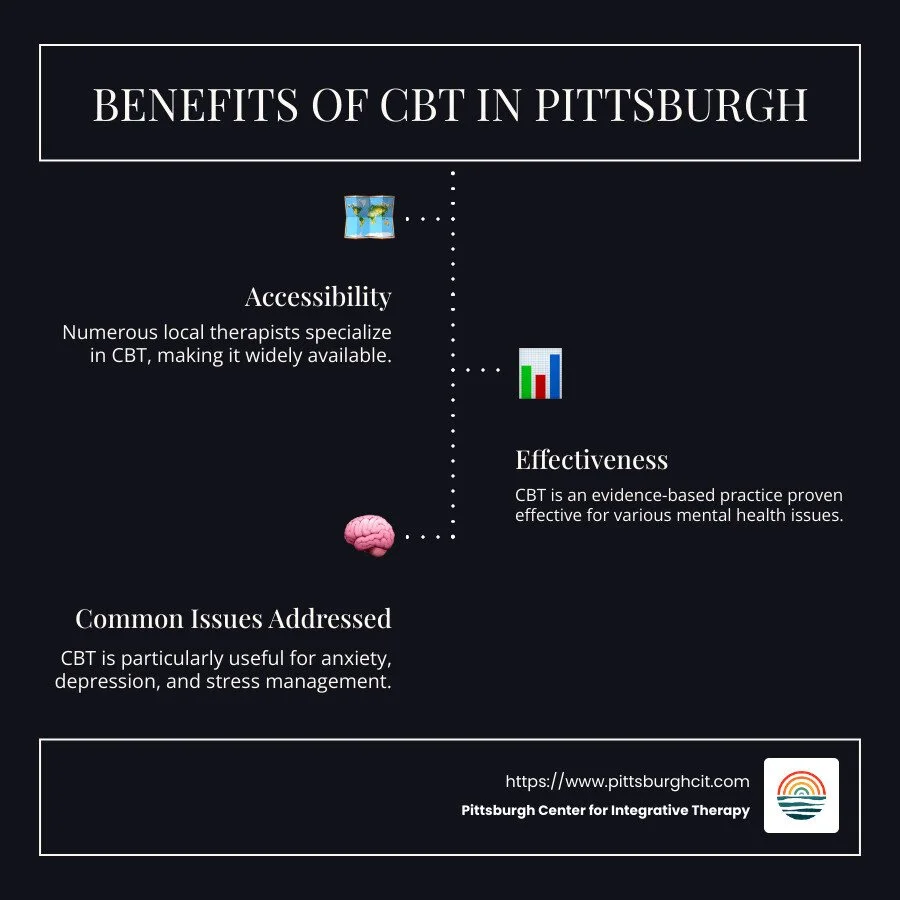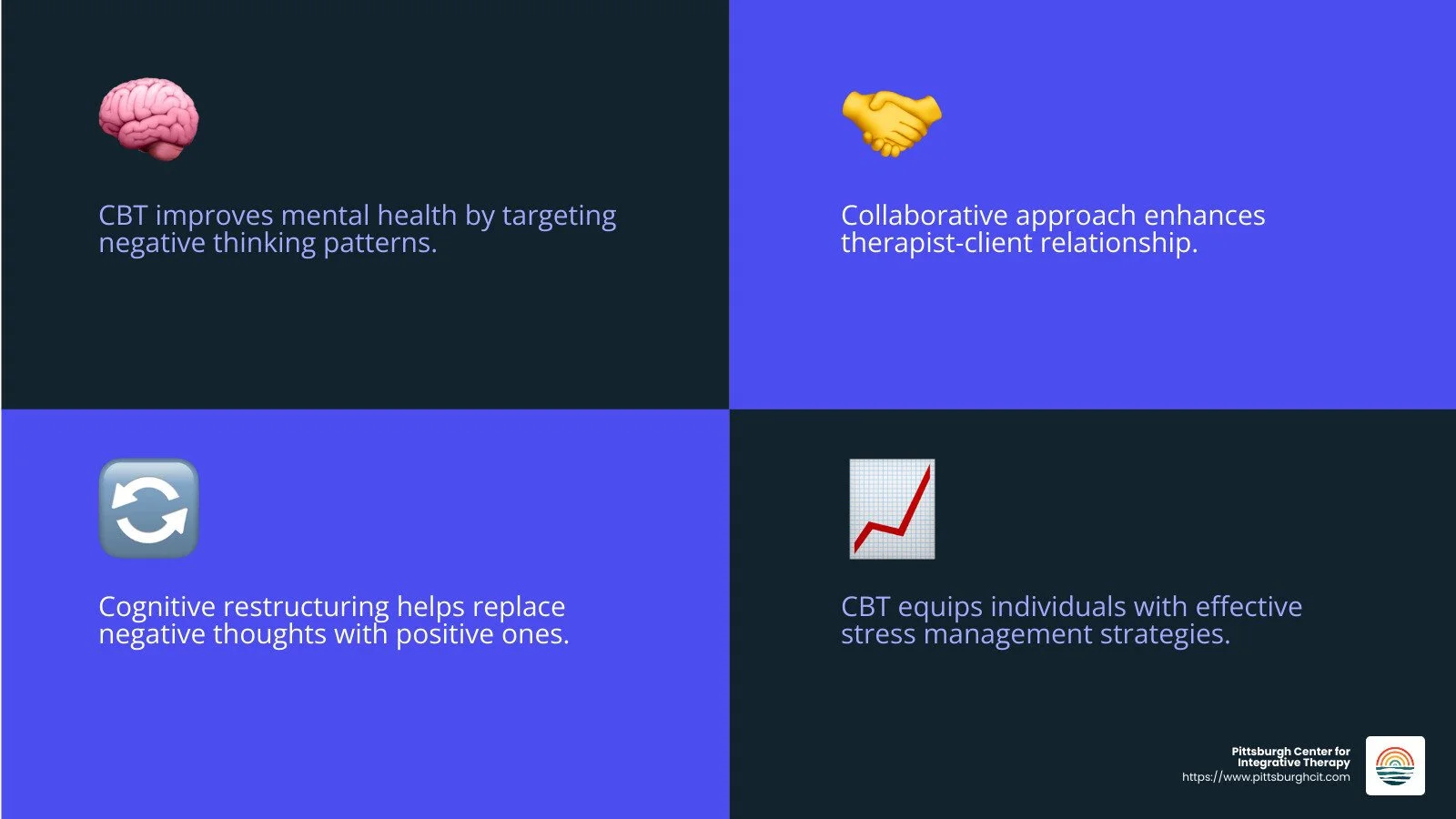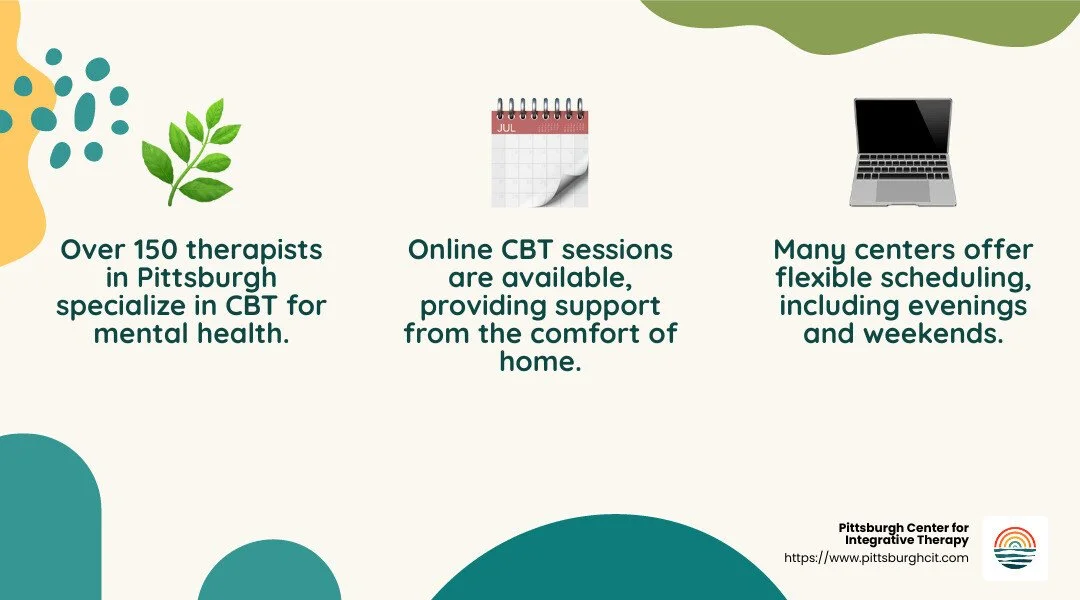CBT in Pittsburgh: Unlocking the Power of Cognitive Behavioral Therapy
Cognitive behavioral therapy Pittsburgh offers a powerful tool for improving mental health by addressing the connections between thoughts, feelings, and behaviors. This therapeutic approach is especially effective for managing anxiety, depression, and stress. By focusing on changing negative thinking patterns, CBT helps individuals develop better coping strategies and improve their emotional resilience.
Efficient and effective: CBT is a structured, goal-oriented therapy that's often brief compared to other therapies.
Evidence-based practice: Proven to be effective in numerous studies for a wide range of mental health issues.
Wide availability: Various therapists in Pittsburgh specialize in CBT, making it accessible to many.
At the Pittsburgh Center for Integrative Therapy, our team specializes in cognitive behavioral therapy (CBT) in Pittsburgh, with a focus on trauma and attachment issues. We use CBT alongside other methods to help clients steer their mental health challenges. We're dedicated to guiding you through understanding this transformative approach.
Understanding Cognitive Behavioral Therapy
Cognitive Behavioral Therapy (CBT) is a popular method for tackling mental health issues by focusing on how thoughts, feelings, and behaviors are interconnected. This approach helps people change negative thinking patterns to improve their emotional well-being.
Principles of CBT
At its core, CBT is based on the idea that our thoughts directly affect our feelings and behaviors. If we can change our thoughts, we can change how we feel and act. This principle makes CBT a practical and action-oriented therapy.
Thoughts influence emotions and behaviors: Negative thoughts can lead to distressing emotions and unhelpful behaviors.
Focus on the present: CBT emphasizes current thoughts and beliefs rather than past experiences.
Collaborative approach: Therapists and clients work together to identify and change negative patterns.
Techniques Used in CBT
CBT uses a variety of techniques to help individuals manage their mental health. Here are some common ones:
Cognitive restructuring: This involves identifying and challenging negative thoughts to replace them with more positive ones.
Behavioral activation: Encourages engaging in activities that bring joy or accomplishment to combat depression.
Exposure therapy: Gradual exposure to feared situations to reduce anxiety over time.
Skills training: Teaches coping skills like stress management and problem-solving.
Benefits of CBT
CBT offers numerous benefits that make it a sought-after therapy for many individuals:
Improved mental health: Helps manage anxiety, depression, and PTSD.
Better relationships: Improves communication and understanding, leading to healthier connections.
Increased self-awareness: Promotes insight into thoughts and behaviors, fostering personal growth.
Effective coping skills: Equips individuals with strategies to handle stress and life's challenges.
In Pittsburgh, CBT is widely available and supported by a network of skilled therapists dedicated to helping clients achieve better mental health. By understanding and applying the principles and techniques of CBT, individuals can open up a more fulfilling life.
Next, we'll explore how CBT is practiced locally and the accessibility of cognitive behavioral therapy Pittsburgh for those seeking help.
Cognitive Behavioral Therapy in Pittsburgh
In Pittsburgh, Cognitive Behavioral Therapy (CBT) is not just a buzzword—it's a lifeline for many seeking mental health support. The city boasts a diverse range of therapists who specialize in CBT, making it a go-to option for individuals looking to improve their mental well-being.
Local Therapists
Pittsburgh is home to a variety of mental health professionals, including licensed professional counselors, psychiatric nurse practitioners, and family therapists. These experts are well-equipped to provide CBT, tailoring their approach to meet the unique needs of each client. The emphasis on building strong therapeutic relationships ensures that clients feel supported throughout their journey.
Accessibility
Accessing cognitive behavioral therapy in Pittsburgh is straightforward and convenient. Many therapy centers offer flexible scheduling options, including evening and weekend appointments, to accommodate busy lifestyles. Additionally, online therapy sessions are available through secure telehealth platforms, making it easier for those who prefer the comfort of their home.
To book an appointment, you can simply call a therapy center or fill out a contact form online. This ease of access ensures that anyone in need can quickly get the support they require.
Innovative Approaches
Pittsburgh therapists are known for their innovative approaches, incorporating techniques like EMDR and mindfulness practices alongside traditional CBT methods. This variety offers clients a comprehensive toolkit for addressing their mental health challenges.
A Community of Support
The city's mental health resources extend beyond individual therapy. Wellness centers offer additional services such as mindfulness practices, meditation, and health coaching. These holistic approaches complement CBT, promoting overall well-being and resilience.
Pittsburgh's commitment to mental health is evident in the accessibility and quality of CBT services available. Whether you're dealing with anxiety, depression, or stress, local therapists are ready to help you steer your mental health journey.
Benefits of CBT for Mental Health
Cognitive Behavioral Therapy (CBT) is a powerful tool for improving mental health. It's especially effective in managing anxiety, depression, and stress. Let's explore how CBT can make a difference in these areas.
Anxiety Relief
Anxiety can feel overwhelming, but CBT offers a structured way to tackle it. By identifying negative thought patterns, CBT helps you understand what triggers your anxiety. Then, you learn practical techniques to challenge these thoughts and replace them with more positive ones. This process reduces anxiety symptoms and gives you a sense of control over your emotions.
A study from the Pittsburgh Center for Integrative Therapy highlights how clients have successfully used CBT to manage anxiety. By focusing on real-life scenarios and practicing new responses, clients report feeling calmer and more confident in stressful situations.
Depression Management
Depression can make even the smallest tasks seem daunting. CBT breaks down this complex issue into manageable parts. It encourages you to set achievable goals and engage in activities that boost your mood. By changing your thought patterns, CBT helps you see the world in a more positive light.
Research shows that CBT is as effective as medication for some people with depression. It offers long-term benefits by teaching skills that prevent future depressive episodes. This makes CBT a valuable option for those seeking sustainable mental health improvement.
Stress Management
Life's pressures can lead to chronic stress, affecting your physical and mental health. CBT provides strategies to cope with stress more effectively. It teaches you to recognize stressors and develop healthier responses. Techniques like deep breathing and mindfulness are often integrated into CBT sessions, promoting relaxation and resilience.
In Pittsburgh, many therapists incorporate these methods into their practice, offering clients a comprehensive approach to stress management. This holistic care ensures that you're not just managing stress but thriving despite it.
Cognitive Behavioral Therapy in Pittsburgh is not just about addressing symptoms; it's about empowering you to live a healthier, more balanced life. By focusing on anxiety, depression, and stress, CBT equips you with the tools needed to overcome challenges and improve your overall well-being.
How to Choose the Right CBT Therapist in Pittsburgh
Finding the right cognitive behavioral therapy Pittsburgh specialist can make all the difference in your mental health journey. Here’s how to ensure you choose the best fit for your needs:
Qualifications Matter
First, check the therapist's qualifications. In Pennsylvania, therapists should be licensed by the State Board of Social Workers, Marriage and Family Therapists, and Professional Counselors. This ensures they meet professional standards. A licensed therapist is not only trained but also adheres to ethical guidelines.
Experience Counts
Experience is crucial when selecting a CBT therapist. Look for someone who has a track record of working with clients facing similar issues as yours. If you’re dealing with anxiety, depression, or stress, a therapist with specific experience in these areas can provide targeted help.
Many therapists in Pittsburgh have experience in innovative methods like EMDR and Internal Family Systems (IFS), enhancing their CBT practice.
Personal Fit is Key
Even with the right qualifications and experience, the personal fit is essential. You should feel comfortable and understood by your therapist. The initial consultation is a great time to assess this. Do you feel safe and respected? Is the therapist’s communication style aligned with yours?
Therapy is a partnership. Trust and mutual respect are vital for success. If you don’t feel a connection, it’s okay to look for someone else.
Practical Considerations
Consider practical aspects like location and availability. Pittsburgh therapists often offer flexible scheduling, including evening and weekend appointments, to accommodate your needs. Online therapy is also an option, providing convenience and accessibility.
Finally, check if the therapist accepts your insurance or offers a sliding scale fee if cost is a concern. This can make therapy more affordable and reduce financial stress.
By focusing on these factors—and practical considerations—you can find the right CBT therapist in Pittsburgh who will support you on your path to better mental health.
Next, we’ll address some frequently asked questions about CBT to give you a clearer picture of what to expect from this powerful therapeutic approach.
Frequently Asked Questions about Cognitive Behavioral Therapy
What is CBT?
Cognitive Behavioral Therapy (CBT) is a form of talk therapy that helps people identify and change negative thought patterns and behaviors. It’s based on the idea that our thoughts, feelings, and actions are interconnected. By changing how we think about a situation, we can change how we feel and act. CBT is widely used to treat various mental health issues like anxiety, depression, and PTSD.
How long does CBT take to work?
The duration of CBT can vary depending on the individual's needs and the complexity of the issues being addressed. Typically, CBT is a short-term therapy, with most treatment plans ranging from 8 to 20 sessions. However, some people might see improvements in as few as 5 sessions, while others may benefit from a longer course. The effectiveness of CBT is well-documented, with many studies showing significant improvement in symptoms for those who engage in this therapy.
Is CBT covered by insurance?
Many insurance plans cover cognitive behavioral therapy Pittsburgh services, but coverage can vary. It’s important to check with your insurance provider to understand the specifics of your plan. Some plans may require a referral from a primary care doctor, while others may have a network of approved therapists. Additionally, if you're paying out-of-pocket, many therapists offer sliding scale fees to make therapy more affordable. The Pittsburgh Center for Integrative Therapy offers convenient payment options, including cash, check, or major credit cards, ensuring accessibility for everyone seeking mental health support.
Conclusion
At the Pittsburgh Center for Integrative Therapy, we are committed to providing a holistic approach to mental health care. Our mission is to help individuals heal and grow by integrating the mind, body, and spirit. We understand that each person's journey is unique, and our goal is to support you every step of the way.
Our focus on trauma and attachment sets us apart. Trauma can deeply affect a person's life, influencing their thoughts, feelings, and behaviors. As Dr. Bessel van der Kolk, a leading trauma researcher, explains, "Being traumatized means continuing to organize your life as if the trauma were still going on." At our center, we use innovative therapies, like EMDR and somatic therapy, to help clients process and heal from trauma.
We believe in seeing our clients as whole people, not just their symptoms or diagnoses. This perspective allows us to tailor our treatments to each individual's needs, whether they are dealing with anxiety, depression, or the aftermath of trauma. Our team of therapists is trained in various modalities, including CBT, to ensure that we can offer the most effective care possible.
If you're seeking cognitive behavioral therapy in Pittsburgh, or any other form of mental health support, we invite you to reach out to us. Our doors are open to anyone looking to improve their mental well-being and find a path to a healthier, more fulfilling life.
For more information on our services and to schedule an appointment, please visit our website or contact us directly. We are here to help you on your journey to healing and growth.




